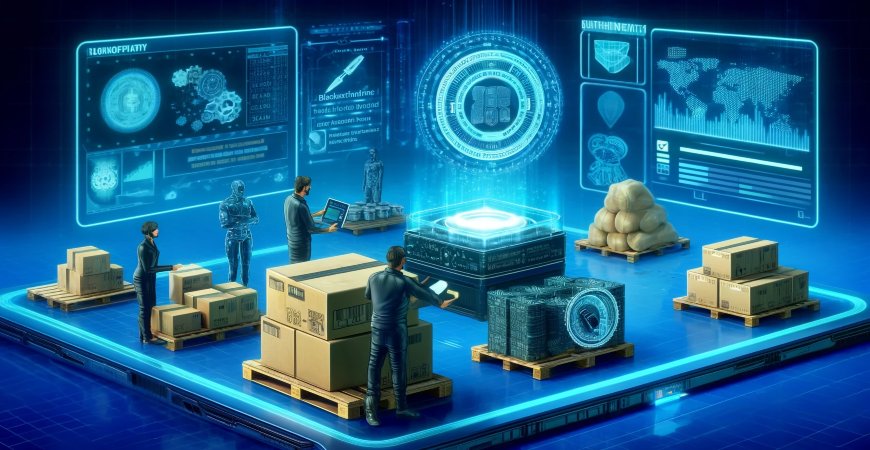Blockchain technology is tipped to boost the global economy by $1.7 trillion in the next decade (per PwC), with an integral part of this being its impact on supply chain management.
This area of decentralized innovations is exactly what this article will explore – touching on several future blockchain applications within supply chains, as well use cases from today in 2024.
For a broader overview of what’s ahead for blockchain technology, check out our article on “The Future of Blockchain.”
Key Takeaways
- 53.2% Annual Growth: Companies like Walmart and IBM have dramatically improved traceability, food safety, and regulatory compliance through blockchain supply chain integrations.
- Major Retailers Adopting Blockchain Technology: Walmart and Amazon are setting standards by using blockchain tech for food traceability and inventory management.
- Integration with IoT for Enhanced Real-Time Tracking: By 2025, blockchain tech combined with IoT will provide real-time tracking of goods, improving transparency and reducing risks.
- Smart Contracts for Automated and Efficient Transactions: Smart contracts will automate and verify transactions, enhancing efficiency and supplier relationships.
Understanding the Future of Blockchain in Supply Chains
As companies increasingly adopt blockchain technology in order to enhance how their products and services are put to market, they can expect improvements in supply chain areas such as traceability, fraud, and streamlining operations.
Technically speaking, this is because the immutable ledger systems of blockchains ensure that every transaction is recorded, verified, and then stored on the network, without being able to be tampered with.
In doing so, the blockchain supply chain market is projected to grow rapidly in the coming years, reaching a whopping $3,272 million by 2026, with an annual growth rate of 53.2%.
8 Predictions and Impacts of Blockchain in Supply Chain Management
With this huge potential in mind, this section is dedicated to exploring the practicalities of integrating blockchain technology within supply chain operations.
The IBM Case Study

Companies like Walmart and IBM are already showcasing how blockchain technology can dramatically improve traceability.
This is because IBM’s Food Trust platform offers end-to-end visibility in the food industry, wherein products can be tracked from farm to shelf. This comprehensive traceability not only prevents fraud, but also ensures food safety and regulatory compliance.
Walmart has integrated IBM’s Food Trust platform, meaning the supermarket goliath can quickly identify the source of any contamination. In turn, this means that the company can take swifter actions in ensuring the safety and quality of its products
Looking ahead, IBM is expected to integrate advanced AI algorithms with its blockchain platforms, to enhance predictive analytics and decision-making capabilities. This integration will allow for real-time optimization of supply chain operations, identifying potential disruptions before they occur, as well as suggesting alternative routes or suppliers.
In addition, IBM is likely to expand its blockchain solutions beyond the food industry, targeting pharmaceuticals and high-value goods sectors where traceability and transparency are critical.
Finally, IBM’s blockchain technology is anticipated to evolve towards greater interoperability with other digital ledger technologies and the internet of things (IoT) devices. This evolution is set to enable seamless data exchange across various platforms and devices, further enhancing the accuracy and efficiency of supply chain management.
By 2026, IBM’s blockchain solutions are predicted to be a cornerstone in global supply chain ecosystems, setting new standards for transparency, security, and operational excellence.
Widespread Adoption by Major Retailers
Major retailers like Amazon are also at the forefront of blockchain adoption for supply chain management, setting industry standards that are likely to shape future trends. In doing so, the company aims to improve its worldwide inventory management, reduce shipping errors, and enhance its overall customer experience.
With major players like Walmart and Amazon paving the way, experts predict that within the next five years, blockchain tech will become a standard tool across various industries, driven by its ability to provide secure, transparent, and efficient supply chain operations.
Integration with IoT for Real-Time Tracking

By 2025, the integration of blockchain tech with the Internet of Things (IoT) could restructure supply chain management, making it a standard practice across industries.
Here, IoT devices will continuously feed real-time data into blockchain networks, providing up-to-the-minute updates on the status, location, and condition of goods. For example, sensors attached to shipments can monitor optimal conditions for perishable goods. In turn, this data will be securely recorded on blockchain ledgers, allowing all stakeholders to verify the integrity of the supply chain at every stage.
As a current use case, shipping and logistics company Maersk utilizes TradeLens, which uses IoT to monitor the condition of cargo during transit, reducing the risk of damage and loss.
This means that beyond food, blockchain integrations will expand to other sectors such as automotive and electronics, where precise tracking and condition monitoring of high-value components is vital.
Smart Contracts for Automated Transactions
Continuing with the Maersk TradeLens example, this system utilizes smart contracts to automate and verify shipping transactions, as well as execute shipping agreements.
Following this lead, other companies are set to increasingly leverage smart contracts in order to ensure that orders are placed, received, and paid for automatically upon the fulfillment of agreed conditions.
Intuitively, this process will reduce procurement cycle times, as well as enhance supplier relationships by ensuring timely payments.
Blockchain to Secure 30% of Global Supply Chains by 2032
By 2032, blockchain technology is projected to secure 30% of global supply chains.
One of the key sectors that it will benefit here is pharmaceuticals – i.e. an industry where traceability is crucial. In practice, this will see blockchain’s immutable ledger enable real-time tracking of drug shipments, which will help in quickly identifying and isolating compromised batches, as well as prevent counterfeit drugs from entering the market.
In a more general sense, companies will be able to verify the origins and handling of their products, meeting stringent regulatory standards without the need for extensive paperwork. On the flip side, consumers purchasing high-end electronics or organic food products will also be able to trace the origin and journey of their purchases.
This increased trust and transparency will result in more reliable supply chains, bolstering consumer confidence and potentially driving higher sales for companies that adopt these technologies.
Reduced Counterfeiting and Enhanced Authenticity

LVMH – the luxury goods conglomerate behind the likes of Louis Vuitton, Dior, Moët & Chandon, Hennessy, and more – currently combats fraud through its blockchain platform ‘Aura’ tracking and authenticating luxury products.
By integrating blockchain tech into supply chains, LVMH therefore ensures that consumers receive genuine items that aren’t counterfeits. This approach also protects the brand’s reputation and offers consumers transparent and reliable information about their purchases.
In the near future, we can expect blockchain technology to become a standard tool for verifying the authenticity of high-value and sensitive products across various industries. As previously mentioned, this will be useful for a range of sections, including pharmaceuticals, electronics, and automotives.
Interoperability and Standardization Efforts
In time, blockchain integrations within supply chains will eventually see the development of standardized protocols and cross-chain technologies that will make the sector interoperable across different blockchains.
The Blockchain Interoperability Alliance – which includes companies like ICON, Aion, and Wanchain – is at the forefront of creating these standards, as it is striving to bridge the gaps between disparate blockchain systems, enabling a more cohesive and integrated network.
Enhanced Collaboration and Data Sharing
Blockchain technology integrations will also lead to higher levels of trust and cooperation among stakeholders.
As data integrity is a cornerstone of effective supply chain management, the immutable ledger systems of blockchains will ensure access to accurate and real-time information for all parties. This capability will streamline processes such as inventory management, order fulfillment, and supplier coordination, to further reduce delays and errors caused by data discrepancies.
Additionally, manufacturers, distributors, and retailers can seamlessly share and verify production schedules, shipment statuses, and inventory levels, leading to more synchronized and efficient operations.
How Blockchain Technology Can Address Supply Chain Challenges

As is evident, blockchain technology holds the potential to completely revolutionize the supply chain process. In addition to the proficiencies listed above, here are some other supply chain challenges it can tackle.
Addressing Supply Chain Resilience and Adaptability
Blockchain technology can facilitate more efficient and responsive supply chain management in the event of unexpected disruptions, such as natural disasters, by providing real-time visibility into affected supply chain nodes.
In practice, this allows companies to quickly identify and contact alternative suppliers. Further, this agility will be important in maintaining supply chain continuity and minimizing downtime.
Experts also foresee the rise of blockchain-based insurance products that offer faster and more reliable claims processing, thereby providing an additional layer of financial protection for supply chain stakeholders.
Tackling Geopolitical Instability
One of the pressing challenges in supply chains today is geopolitical instability. For example, conflicts in regions like Ukraine and the South China Sea disrupt global trade routes and complicate logistics planning. This instability has led to a shift towards more regionalized supply chains which blend global and local strategies.
As a partial remedy, blockchain tech can provide a decentralized and tamper-proof platform for real-time tracking and verification of international goods. And with the added integrations of IoT devices, companies can obtain even more real-time data, to further maintain visibility over their supply chains.
Overcoming Cybersecurity Threats
Cyberattacks can compromise sensitive data and disrupt operations across the supply chain.
However, blockchain technology, with its decentralized and encrypted nature, offers a robust alternative that can protect against these threats – which include things such as unauthorized access and data tampering.
Environmental Sustainability and Regulatory Compliance
Environmental regulations and sustainability goals are putting pressure on supply chains to track and reduce their carbon footprint.
Blockchain tech can help in this by providing an immutable record of emissions and resource usage at every stage of the supply chain. Such transparency can then support compliance with regulations, such as the EU’s Corporate Sustainability Reporting Directive. It can also facilitate the calculation of Scope 3 emissions, which include all indirect emissions that occur in the ‘value chain’ of companies.
Future advancements might include the integration of blockchain with AI-driven analytics to automate the monitoring and reporting of environmental impacts, making it easier for companies to meet regulatory requirements and achieve sustainability targets.
Addressing Labor Shortages and Quality Control
Supply chains are also grappling with labor shortages and quality control issues, particularly in sectors like automotive and aerospace. Blockchain tech can address these challenges by enabling better tracking of labor practices and quality standards across the supply chain.
Furthermore, smart contracts can automate compliance checks and ensure that all parties adhere to agreed standards and practices – and in the future, applications could include more advanced smart contracts that leverage machine learning to predict and preempt quality control issues, ensuring consistent product quality and reducing the dependency on manual labor.
The Future of Blockchain in Supply Chain – FAQs
Which blockchain is best for supply chains?
IBM Food Trust, TradeLens, and Ethereum are top choices, offering features like end-to-end traceability and smart contracts that are tailored for supply chains.
How will blockchain technology improve transparency in the supply chain?
Blockchain provides a decentralized, immutable ledger of all transactions, allowing real-time visibility and verification. For example, Walmart uses it to track food origins.
What future technologies could be integrated with blockchain technology to further revolutionize the supply chain?
Integration with IoT, AI, and big data analytics will optimize supply chain operations, predict demand, and prevent disruptions by providing real-time data and insights.
How does blockchain reduce costs in supply chain management?
Blockchain eliminates intermediaries and automates processes with smart contracts, lowering administrative and transaction costs. For example, Maersk's TradeLens reduces shipping documentation overheads.
What are the main challenges when implementing blockchain technology into supply chains?
Challenges include scalability, interoperability, and initial costs. Solutions like sharding and off-chain transactions are being developed to address these.
 Never miss an Update!
Never miss an Update!  Top Cryptos to buy?
Top Cryptos to buy?







